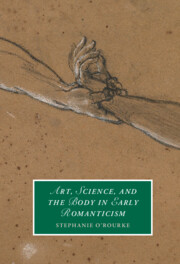‘Stephanie O’Rourke’s Art, Science, and the Body in Early Romanticism is an exemplary book … Amply illustrated with numerous color images and framed by a substantial concluding chapter, the book presents a capstone vision of how histories of art and science can be told together.’
Matthew Hunter
Source: Nineteenth-Century Art World Wide
‘O’Rourke forces us not only to think anew about familiar paintings, but to reflect on how we establish relationships between art and science in other cases … an approach that has the potential to reconceptualize not just the work of individual artists, but the entire Romantic era’
Oliver Wunsch - Boston College
Source: CAA Reviews
‘As her wide reading and close looking show, these artists' attempts to make the body legible hit at every juncture upon instability of the self, invisibility of the causes of action, and other sources of error and indeterminacy in scientific method and Enlightenment efforts to apply it to modern life. The results have not always been appreciated as art. To reveal them as vibrant applications of-and challenges to-the most iconoclastic science of their time is the task O'Rourke sets herself.’
Andrei Pop
Source: Review 19
‘Each chapter focuses on a different scientific discourse and a different artist’s engagement with that discourse, which collectively map out a variety of historical approaches to the mind, the body, and their intersection with issues of representation … O’Rourke debuts as equal parts erudite scholar and exceptional storyteller, which is an all-too-rare gift in academic prose.’
Nina Amstutz
Source: H-France Forum
‘Since the 1960s, we’ve been exiting a period in which we harbored thoughts of reason’s dominance in the human mind. Reason and vision had always been correlated, at least since the seventeenth century (call this empiricism). But what is this new landscape we are entering by which rational vision takes its place beside other modes of being - various, diverse ways of inhabiting the world? O’Rourke’s beautifully written, crisply argued book begins to ask this question.’
Kevin Chua
Source: H-France Forum
‘I really enjoyed reading this book. It’s beautifully illustrated with nearly fifty images that exhibit many beautiful and strange artworks produced during the Romantic period.’
Sharon Ruston
Source: The Charles Lamb Bulletin
‘Written in fluid, alert and lively prose, these elegant analyses offer captivating hypotheses, with a great deal of oratorical precaution and sometimes a restraint that does credit to the author.’
Muriel Adrien
Source: H-France Forum
‘O'Rourke makes a bold proposal, which opens up a whole field of possibilities for writing the relationship between scientific and artistic practices. Indeed, the great originality of this book lies in its object of study: the visual arts and in particular the formal issues that characterize them.’
Sarah Gould
Source: H-France Forum
‘[The book] is beautifully, sumptuously illustrated with fifty full-color images … This treasure trove of images accentuates the virtuosic close reading of paintings that O’Rourke offers in each chapter.’
Jacob Risinger
Source: European Romantic Review



